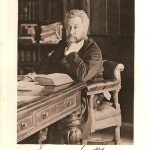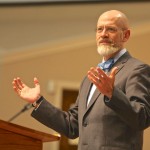 I speak for many when I say that I have not always embraced the doctrines of grace or what is commonly called Calvinism. Its actually unfortunate that a man’s name is associated with the doctrines that came out of the Protestant Reformation. Calvin was not the first to articulate these truths, but merely was the chief systematizer of such doctrines. There was actually nothing in Calvin that was not first seen in Luther, and much of Luther was first found in Augustine. Luther was an Augustinian monk, of course. We would also naturally affirm that there was nothing in any of these men that was not first found in Paul and Peter and John in the New Testament.
I speak for many when I say that I have not always embraced the doctrines of grace or what is commonly called Calvinism. Its actually unfortunate that a man’s name is associated with the doctrines that came out of the Protestant Reformation. Calvin was not the first to articulate these truths, but merely was the chief systematizer of such doctrines. There was actually nothing in Calvin that was not first seen in Luther, and much of Luther was first found in Augustine. Luther was an Augustinian monk, of course. We would also naturally affirm that there was nothing in any of these men that was not first found in Paul and Peter and John in the New Testament.
Even now, I have no desire to be a Calvinist in the Corinthian sense of the word – a follower of John Calvin, per say. Though I believe Calvin was a tremendous expositor of the Scriptures and had many great insights, I am not someone who believes he was in any way infallible. I am with Spurgeon who declared, “There is no soul living who holds more firmly to the doctrines of grace than I do, and if any man asks me whether I am ashamed to be called a Calvinist, I answer – I wish to be called nothing but a Christian; but if you ask me, do I hold the doctrinal views which were held by John Calvin, I reply, I do in the main hold them, and rejoice to avow it.” (C. H. Spurgeon, a Defense of Calvinism)
In coming to understand these doctrines that are now so precious to me, I now realize that there were fortresses built in my mind to defend against the idea of God being Sovereign in the matter of salvation. Such was my total depravity! These fortresses were not made of stone and brick but of man made ideas concepts that I believed Scripture taught with clarity. These fortresses did not come down easily. In fact, I believe it is a work of Divine grace in the heart not only to regenerate His people, but also to open hearts and minds, even of His own people, to the truth of His Sovereignty in election.
There are many false concepts about Calvinism. Here are five that are very common:
1. CALVINISM DESTROYS EVANGELISM
I think some Calvinists do have an aversion for evangelism, and this is something that needs to be addressed whenever this tendency is seen, yet both historically and biblically, nothing could be further from the truth. It is quite easy to prove that the whole missions movement was started by Calvinists who believed Christ had His elect sheep in every tribe, tongue, people and nation. Romans 8 and 9 teaches election clearly, and Romans 10 tells us of the necessity of preaching the Gospel. How shall they (the elect) hear without a preacher? Romans 10 is in no way a contradiction to Romans 8 and 9.
Divine election is the only hope of evangelism. No one we speak to about Christ is beyond hope, for God may well have ordained from all eternity that our conversation or preaching is to be the very means by which He would achieve His ends – the gathering of one of His elect sheep into the fold! What a privilege to be used by God in this way.
Divine election should never undermine evangelism. In fact, the truth about election should cause us to continue to proclaim Christ, even when results may not come immediately. The concept of election should actually fuel our evangelism when mere human emotion wanes. We should remember that God has His elect sheep who will hear His voice and will follow Him when we preach the Gospel of Christ. So then faith comes by hearing and hearing the word of Christ (Rom. 10:17).
Election is not a hindrance to evangelism. It simply explains to us why some believe the Gospel and why some do not. Jesus said to one group hearing Him “you do not believe because you are not My sheep” (John 10:26) and Luke explained the evangelistic results of the early church by declaring, “as many as were ordained to eternal life believed.” (Acts 13:48)
2. CALVINISM APPEALS TO THE PRIDE OF MAN
Sadly, some Calvinists do reek of pride and give off an air of being better than those around them, but such is a total betrayal of biblical Calvinism. If we recognize our total depravity or radical corruption, we understand that there was absolutely nothing in us that caused God to look down upon us to show us such favor. The only thing we can say in response to His electing grace is “Lord, why me?”
Romans 9:11-16 11 though they were not yet born and had done nothing either good or bad- in order that God’s purpose of election might continue, not because of works but because of his call- 12 she was told, “The older will serve the younger.” 13 As it is written, “Jacob I loved, but Esau I hated.” 14 What shall we say then? Is there injustice on God’s part? By no means! 15 For he says to Moses, “I will have mercy on whom I have mercy, and I will have compassion on whom I have compassion.” 16 So then it depends not on human will or exertion, but on God, who has mercy.
“God intentionally designed salvation so that no man can boast of it. He didn’t merely arrange it so that boasting would be discouraged or kept to a minimum – He planned it so that boasting would be absolutely excluded. Election does precisely that.” – Mark Webb
3. CALVINISM STUNTS HOLINESS
I have heard this mentioned a few times recently and just scratch my head in wonder about it. One great example are the Puritans, who were strong Calvinists and yet were driven by a desire for holiness. But some see this as a contradiction in terms. Where they get this, I do not know.
God Sovereignly elects some people to salvation but this in no way diminishes our responsibility to make sure that we who profess faith in Christ, actually possess the faith that saves. If you and I do have the real thing and not some fraudulent kind of substitute for the genuine faith that saves.. if we really have the real thing.. there will be evidence to show it. The Scripture, and true Calvinism, teaches us to examine ourselves to see if we are in the faith. I find this to be the biblical mandate rather than simply recalling a time when we raised a hand or walked an aisle, which is what most Christians have been taught. The call to holiness is a call all true Christians will heed for without it, no one will see the Lord. (Heb. 12:14)
4. CALVINISM TEACHES THAT MEN ARE MERELY ROBOTS
Calvinists believes in man’s will. Man always chooses what he most desires at the moment of choice. You are choosing now to read this sentence when there are literally billions of other sentences out there waiting to be read.
Why do you read this sentence right now?
The answer is because at this very moment, this is your strongest desire. It is impossible for you to be reading something else – right now anyway. And this will be the case until a stronger desire for something else (like answering the phone or taking a shower, or going for a walk) rises up in your heart. The heart and the will are inseparably connected.
What we need is not ‘free will’ but wills made free. This is because by nature our hearts only want independence from Christ. We love darkness rather than light. Jesus said, “No man CAN come to Me unless the Father who sent Me draws him, and I will raise him up at the last day” (John 6:44). Calvinists take these words seriously as well as Christ’s words in John 3 which tells that unless a man is first born again (or born from above) he cannot enter or even see the kingdom of God.
“If any man doth ascribe of salvation, even the very least, to the free will of man, he knows nothing of grace, and he has not learnt Jesus Christ aright.” – Martin Luther
George Whitefield, perhaps the greatest Evangelist in church history once declared, “I hope we shall catch fire from each other, and that there will be a holy emulation amongst us, who shall most debase man and exalt the Lord Jesus. Nothing but the doctrines of the Reformation can do this. All others leave free-will in man and make him, in part at least, a Saviour to himself. My soul, come not thou near the secret of those who teach such things . . . I know Christ is all in all. Man is nothing: he hath a free will to go to hell, but none to go to heaven, till God worketh in him to do of His good pleasure.” – Works, pp. 89-90
“If the final decision for the salvation of fallen sinners were left in the hands of fallen sinners, we would despair all hope that anyone would be saved.” – R. C. Sproul
“I do not come into this pulpit hoping that perhaps somebody will of his own free will return to Christ. My hope lies in another quarter. I hope that my Master will lay hold of some of them and say, ‘You are mine, and you shall be mine. I claim you for myself.’ My hope arises from the freeness of grace, and not from the freedom of the will. Free will carried many a soul to hell, but never a soul to heaven.” – Charles Haddon Spurgeon
5. CALVINISM DIMINISHES THE GOD OF LOVE
I think for many, this is the big one. They have a concept concerning the love of God that while very popular, is not particularly biblical. They believe (as I once did) that if God is love, he loves all people in just the same way. I believe God does love everyone in some sense, but He has a love for His Son which is greater than His love for demons, and a love for His sheep which is greater than His love for the goats. Husbands are told to love their wives as Christ loved the church and gave Himself for her. Christ gave Himself for the church in a way He did not for Walmart or McDonalds. No one would ever say about a husband “wow, look at the way this man loves his wife, and the great thing about his love for her is that he loves everyone else’s wife in just the same way.”
This is a truth that needs to be taught with great care because so many have false concepts stemming from being raised on inaccurate teaching about the love of God. We must be patient with such people when pointing them to the biblical texts. Some people think John 3:16 destroys divine election, but of course it does not. Yet a false concept brought to the Scripture text often confirms people in their opposition to what the Bible actually teaches.
However we interpret the words, “Jacob I loved but Esau I hated” I think if we believe the Bible, we all have to admit that in some sense, God had a greater love for Jacob than He did for Esau, or else words mean nothing.
John 17:23 I in them and you in me, that they may become perfectly one, so that the world may know that you sent me and loved them even as you loved me.
God, moved by love for His name and for us, sent His Son into the world to actually save elect sinners, not to merely try to do so. He went all the way in His love for us and did all the work in raising us from spiritual death by a work of supreme, matchless, measureless grace. Because salvation is of the Lord, all the glory for our salvation – absolutely all of it, goes to God alone. Calvinism affirms this.
“The doctrines of original sin, election, effectual calling, final perseverance, and all those great truths which are called Calvinism, though Calvin was not the author of them, but simply an able writer and preacher upon the subject, are, I believe, the essential doctrines of the Gospel that is in Jesus Christ. Now, I do not ask you whether you believe all this – it is possible you may not; but I believe you will before you enter heaven. I am persuaded, that as God may have washed your hearts, he will wash your brains before you enter heaven.” C. H. Spurgeon








